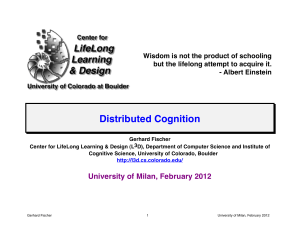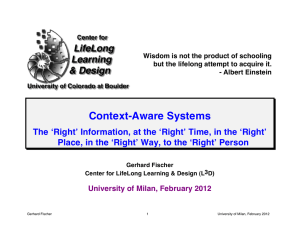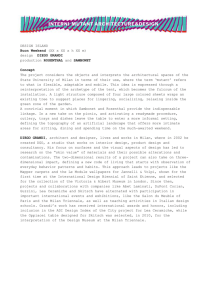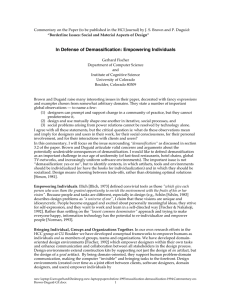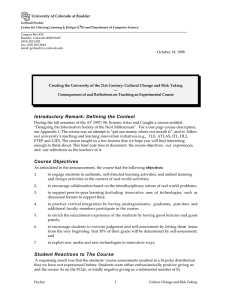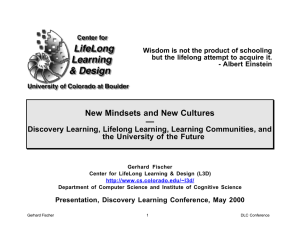Learning and Education in the 21st Century
advertisement
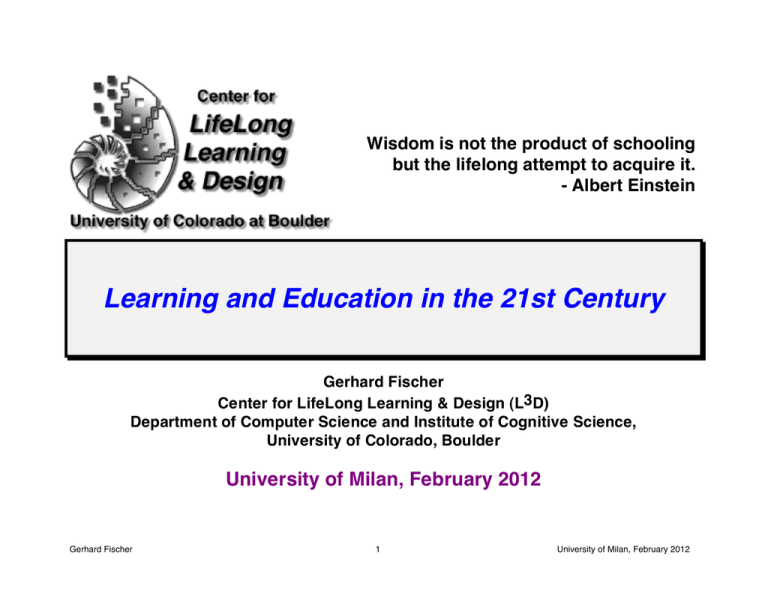
Wisdom is not the product of schooling but the lifelong attempt to acquire it. - Albert Einstein Learning and Education in the 21st Century Gerhard Fischer Center for LifeLong Learning & Design (L3D) Department of Computer Science and Institute of Cognitive Science, University of Colorado, Boulder University of Milan, February 2012 Gerhard Fischer 1 University of Milan, February 2012 Overview Basic Message The Larger Context Lifelong Learning Courses-as-Seeds / Teacher as Meta-Designer Challenges - reflective communities - long tail opportunities Conclusion Gerhard Fischer 2 University of Milan, February 2012 Basic Message many technology enhance learning (TEL) approaches are too timid and not thinking radically enough - by accepting too many established approaches (e.g.: a theory of human learning based solely on school learning is too limited); - by not embracing new learning opportunities (e.g.: exploiting the unique opportunities of social production in which all learners can act as active contributors in personally meaningful problems); - by not moving beyond “gift-wrapping” and “techno-determinism” to coevolution of learning, new media, and new learning organizations challenges: create a transformational conceptual framework - for lifelong-learning by focusing on how learning takes place when the answer is not known - supporting people in taking control of their own learning - for cultures of participation Gerhard Fischer 3 University of Milan, February 2012 A Transformational Conceptual Framework school learning lifelong learning unaided individual human mind distributed cognition reflective practitioner reflective community (cultures of participation) “gift-wrapping” and “techno-determinism” socio-technical environments consumers active contributors (meta-design) learning when the answer is known learning when no one knows the answer (social creativity) Gerhard Fischer 4 University of Milan, February 2012 The Larger Context Gerhard Fischer 5 University of Milan, February 2012 Beyond the Unaided, Individual Human Mind Gerhard Fischer 6 University of Milan, February 2012 Major Eras of Education apprenticeship era: personal, resource intensive, and engaging schooling era: mass oriented, efficient, and bureaucratic lifelong learning era: powerful new digital tools (distributed cognition), interactive, customized, self-directed, collaboration (face-to-face and virtual) Gerhard Fischer 7 University of Milan, February 2012 How the World Has Changed dimension old paradigm new paradigm information scarce plentiful reproduction of documents expensive and restricted cheap specialization low high change within a human life time slow fast interaction / collaboration physical proximity shared professional interests economy rigid, hierarchical organizations, dynamic economy, flexibility, networking, long-term personal identity no long-term Gerhard Fischer 8 University of Milan, February 2012 What's Wrong with the Universities of Today lecture dominated — emphasizing passive knowledge absorption instead of active knowledge construction curriculum dominated — little room for authentic, self-directed learning activities students solve given problems — they do not learn to frame problems problems in school have right or wrong answers — problem in the real world are wicked, ill-defined, ill-structured closed book exams — ignoring distributed cognition little emphasis on collaborative learning and communication skills — working together is regarded as “cheating” Gerhard Fischer 9 University of Milan, February 2012 Co-Evolution: Beyond “Technology-Driven Developments” and “Gift-Wrapping” learning, working and collaboration new learning organizations new media and new technologies Gerhard Fischer 10 University of Milan, February 2012 Stuck in “Giftwrapping” or “Technology-Driven Developments” “There is nothing so useless as doing efficiently that which should not be done at all.” — Peter Drucker “Giftwrapping” - using technology as an add-on to existing practices instead of fundamentally rethinking what education should and could be about in the future - “distance learning is different from classroom learning at a distance” - Classroom Response Systems ( "Clickers") Technology-Driven Developments - “all schools on the Internet” necessary, but not sufficient Gerhard Fischer 11 University of Milan, February 2012 Gerhard Fischer 12 University of Milan, February 2012 Gerhard Fischer 13 University of Milan, February 2012 Innovations digital divide: OLPC (=one laptop per child) = $100 computer OpenCourseware (OCW), Massachusetts Institute of Technology (MIT) - MIT will put all its course content, undergraduate and graduate, into Web-based format - the OCW website will be open and freely available to the world - MIT will commit to OCW as a permanent, sustainable activity Gerhard Fischer 14 University of Milan, February 2012 Challenges Created by MIT’s OpenCourseware commoditizing the ‘content’ sharpens the focus on the substantive values of residential education: personal attention from faculty and participation in learning and research communities move away from large passive lectures towards active learning environments look beyond the simplicities of information to the complexities of learning, knowledge, judgment, communities, and organizations emphasize “learning to be” in addition to “learning about” Gerhard Fischer 15 University of Milan, February 2012 Lifelong Learning Gerhard Fischer 16 University of Milan, February 2012 Our Credo of Lifelong Learning assumption: If the world of working and living relies on collaboration, creativity, definition and framing of problems and if it requires dealing with uncertainty, change, and intelligence that is distributed across minds, cultures, disciplines, and tools consequence: then education should foster on competencies that prepare students for having meaningful and productive lives in such a world Gerhard Fischer 17 University of Milan, February 2012 Science of Learning “A decade of interdisciplinary research on everyday cognition demonstrates that school-based learning, and learning in practical settings, have significant discontinuities. We can no longer assume that what we discover about learning in schools is sufficient for a theory of human learning.” — Scribner and Sachs “In important transformations of our personal lives and organizational practices, we must learn new forms of activity which are not there yet. They are literally learned as they are being created. There is no competent teacher. Standard learning theories have little to offer if one wants to understand these processes.” — Yrjö Engeström Gerhard Fischer 18 University of Milan, February 2012 Formal and Informal Learning? <source: LIFE Center, University of Wash + Stanford> Gerhard Fischer 19 University of Milan, February 2012 Facilitating Cultures of Participation From Broadcast to Collaboration Medium (1996: Fischer, Ambach, Ostwald, Repenning) Web Master Delegation Feedback (via email or forms) Distributed Collaboration Seed World Wide Web World Wide Web Web Users M1 M2 M3 The Web as Broadcast Medium Broadcast with Feedback Evolutionary and Collaborative Design Gerhard Fischer 20 University of Milan, February 2012 Courses-as-Seeds: Teacher as Meta-Designer examples: http://l3d.cs.colorado.edu/~gerhard/courses/index.html teachers creates seeds: - lecture notes readings assignments questionnaires project proposals students are active contributors evolutionary growth - answers to assignments and questionnaires: contributors and summarizers - project ideas, initial proposal, progress report, final report Gerhard Fischer 21 University of Milan, February 2012 Home Page of one Of Our Courses Gerhard Fischer 22 University of Milan, February 2012 Challenges reflective communities “long tail” opportunities Gerhard Fischer 23 University of Milan, February 2012 Reflective Practitioners Reflective Communities Large Conceptual Distance — Limited Common Ground Gerhard Fischer 24 University of Milan, February 2012 Software Professionals Acquiring Domain Knowledge Gerhard Fischer 25 University of Milan, February 2012 Domain Experts Acquiring Media Knowledge Gerhard Fischer 26 University of Milan, February 2012 From Reflective Practitioners to Reflective Communities (supported by transdisciplinary collaboration) Gerhard Fischer 27 University of Milan, February 2012 The Long Tail theory of the Long Tail: our culture and economy is increasingly shifting away from a focus on a relatively small number of “hits” (mainstream products and markets) at the head of the demand curve and toward a huge number of niches in the tail main opportunity — digital artifacts: computer programs, movies, books, 3D models of buildings, …. as the costs of production and distribution fall, there is less need to lump products and consumers into one-size-fits-all containers hypothesis: without the constraints of physical shelf space and other bottlenecks of distribution, narrowly-target goods and services can be as economically attractive as mainstream fare. Gerhard Fischer 28 University of Milan, February 2012 Exploiting “Long Tail” Opportunities in Business Gerhard Fischer 29 University of Milan, February 2012 Specific Examples of the Long Tail Gerhard Fischer 30 University of Milan, February 2012 Castles in Northern Germany in the 3D Warehouse the current environment: Gerhard Fischer 14 models (4 of them shown) contributed by: 6 contributors owner of the collection serves as curator 31 University of Milan, February 2012 The Other End: Cultural Literacy Gerhard Fischer 32 University of Milan, February 2012 A New Synergy: Basic Knowledge/Skills and Long-Tail basic skills: learning to learn, learning on demand, meta-cognitive skills, soft skills (different from Hirsch “cultural literacy”) long-tail: - interest passion self-directed learning intrinsic motivation personally meaningful problems extensive coverage needed for supporting the infinite numbers of interesting topics — will be facilitated by a “meta-design” culture examples: - Wikipedia - 3D objects in Google Earth / 3D Warehouse Gerhard Fischer 33 University of Milan, February 2012 Rethinking and Reinventing Learning and Education from a “Long-Tail” Perspective basic beliefs: - all people are interested in something (Viking Ships, Dinosaurs, gambling, Nuremberg trials, White Rose, Castles in Northern Germany, ……) - Whatever someone’s particular interest is, there is some niche community already formed on the net that the person can join a new synergy and hybrid model: integrate head and tail of the long-tail) create richer learning environments - head — basic knowledge and skills: learning to learn, learning on demand, preparation for future learning, soft skills, digital fluency, …………… - tail — personally meaningful problems: interest and passion, self-directed learning and intrinsic motivation, local knowledge in a globalized world Gerhard Fischer 34 University of Milan, February 2012 A Long-Tail Interpretation for Collaborative Learning long-tail learning refers at least to two aspects - learning about exotic topics outside the mainstream education curriculum - the opportunity to communicate with people who share similar interests somewhere in the world on a regular basis the participatory Web 2.0 provides unique possibilities for an educational interpretation of the “Long Tail” thereby creating new feasibility spaces for collaborative learning Gerhard Fischer 35 University of Milan, February 2012 A Reinterpretation of the Long Tail for Collaborative Learning Web-Based Businesses Learning and Discovery unlimited shelf-space unlimited knowledge megahits core curriculum niche markets passion for unique topics hybrid model of distribution hybrid model of learning and discovery many interesting books, movies, songs will not enter the traditional marketplace many interesting topics and ideas will not be taught in schools and universities Gerhard Fischer 36 University of Milan, February 2012 Questions to be Explored How can we envision a productive synergy between the head and the tail and create mechanisms to support and exploit this synergy? How can the passion associated with topics from the tail be integrated with important basic knowledge and skills from the head that they successfully complement each other? example: Computer-Generated Poetry (Tail) Probability Theory (Head) Do we want to keep requiring everyone to learn the same thing in school rather than pursuing their deep interests? which support can be provided for letting people pursue their deep interest? Do we want to keep extending the years of schooling to encompass the expanding knowledge base? Gerhard Fischer 37 University of Milan, February 2012 A Real Story about Being Passionate about Learning — Computer-Generated Poetry (Tail) Probability Theory (Head) course for gifted high-school students studentx: no interest in math project: computer-generated poetry - Gerhard Fischer sentence structure: <article> <adj> <noun> <verb> <art> <noun> noun: = "house mouse spouse ........" use of a random number generator which returns values between 0 and 9 noun list contains 18 objects ----> studentx uses: SUM RANDOM RANDOM 38 University of Milan, February 2012 A Computer-Generated Poem — Der Dumme Student Das dumme Stubenmaedchen verflucht die Schlampe das lustige Kindermaedchen verbrennt keine Pampe jedes kluge Maedchen ionisiert den Tresen ein verschrumpeltes Maedchen verbrennt das Wesen kein ausgereifter Professor kocht den Wurm kein aufgespiesster Student besteigt den Turm. Der kleine Hausmeister elektrisiert einen Ball jedes schweinslederne Maedchen seziert einen Knall der gefriergetrocknete Bergsteiger erfreut das Bier jede erdrosselte Jungfrau untersucht einen Stier ein kleiner Computer massakriert jede Flasche jeder erdrosselte Mann bearbeitet die Asche. Gerhard Fischer 39 University of Milan, February 2012 Random 0 to 9 250 frequency 200 150 100 50 0 0 Gerhard Fischer 1 2 3 4 40 5 6 7 8 9 University of Milan, February 2012 Sum of Random and Random 200 180 160 frequency 140 120 100 80 60 40 20 Gerhard Fischer 41 19 18 17 16 15 14 13 12 11 10 9 8 7 6 5 4 3 2 1 0 0 University of Milan, February 2012 Word of Random and Random 140 120 frequency 100 80 60 40 20 Gerhard Fischer 42 19 18 17 16 15 14 13 12 11 10 9 8 7 6 5 4 3 2 1 0 0 University of Milan, February 2012 Lessons to Be Learned from the Story studentx learned some aspects of probability theory grounded in a self-directed learning activity provide opportunities which change people's lives • intrinsic motivation is crucial • “falling in love” with something studentx ended up studying computer science “normal” learning experience: learners work hard because they have to (extrinsic motivation) our goal: learners work hard because they want to( intrinsic motivation) Gerhard Fischer 43 University of Milan, February 2012 Conclusion: Technology Enhanced Learning (TEL) Needs to Be Less Timid the future is not out there to be discovered — it has to be invented and designed Machiavelli: “People who want to change institutions, have all those as their enemies who have done well under the old conditions” Winston Churchill: “This is not the end. It is not even the beginning of the end. But it is, perhaps, the end of the beginning.” Gerhard Fischer 44 University of Milan, February 2012
